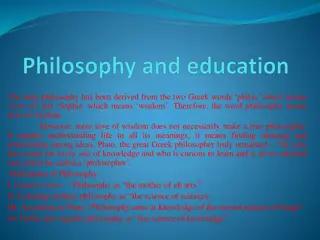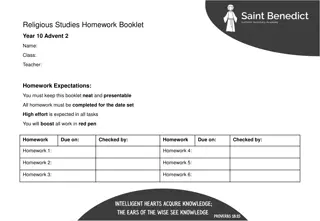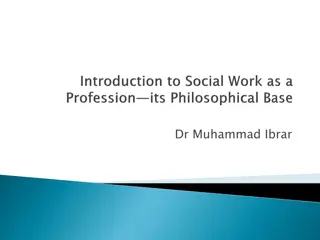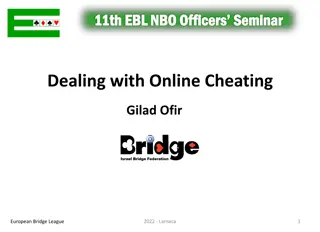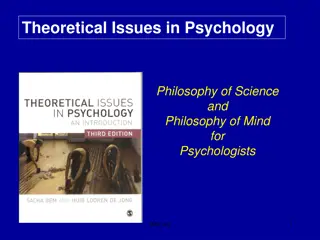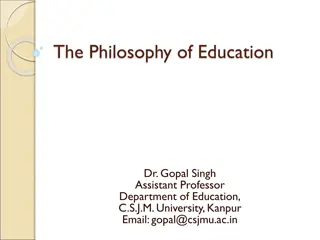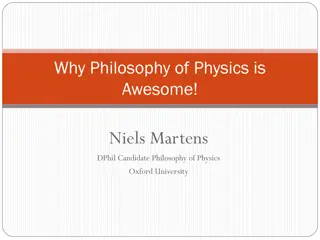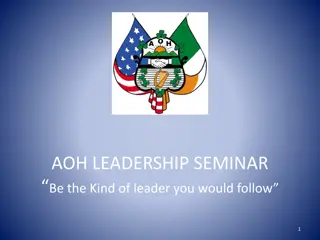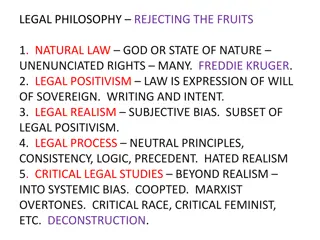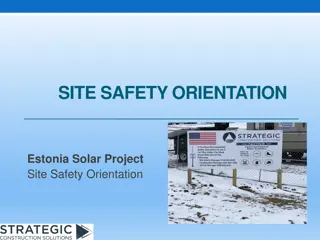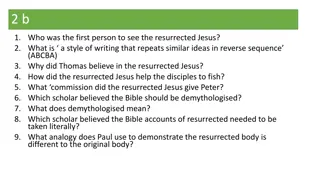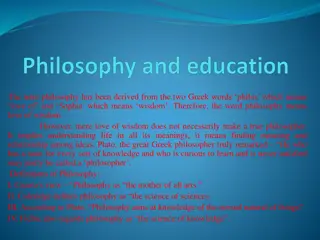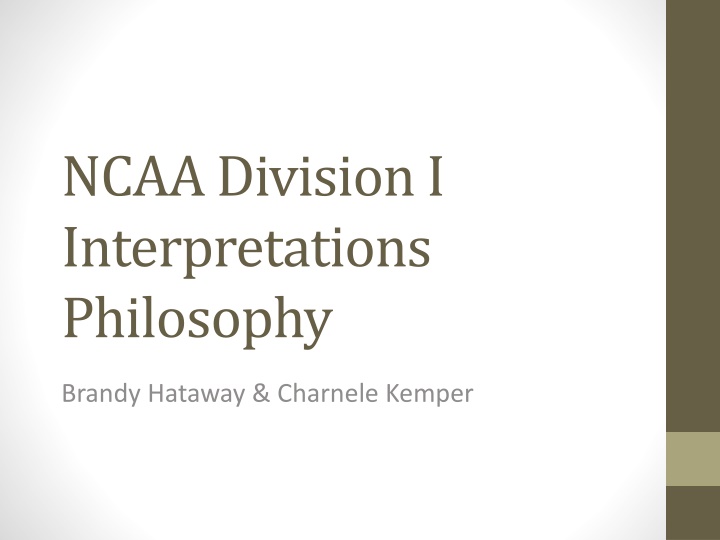
NCAA Division I Interpretations Philosophy Overview and Application
Explore the NCAA Division I Interpretations Philosophy, including standards of review, background aligning with collegiate model rules initiative, and applications covering various scenarios such as health, safety, academic integrity, and more to promote shared responsibility and decision-making within the Division I community.
Download Presentation

Please find below an Image/Link to download the presentation.
The content on the website is provided AS IS for your information and personal use only. It may not be sold, licensed, or shared on other websites without obtaining consent from the author. If you encounter any issues during the download, it is possible that the publisher has removed the file from their server.
You are allowed to download the files provided on this website for personal or commercial use, subject to the condition that they are used lawfully. All files are the property of their respective owners.
The content on the website is provided AS IS for your information and personal use only. It may not be sold, licensed, or shared on other websites without obtaining consent from the author.
E N D
Presentation Transcript
NCAA Division I Interpretations Philosophy Brandy Hataway & Charnele Kemper
Overview Background. Data. Feedback. Case Studies. NCAA Division I Committee for Legislative Relief (CLR).
Background Aligns with the NCAA Working Group on Collegiate Model - Rules initiative from 2011. Developed collaboratively by academic and membership affairs, enforcement, Collegiate Commissioners Association Compliance Administrators (CCACA) and National Association for Athletics Compliance(NAAC). Goal is to develop shared responsibility by increasing local decision making. Minimize burdensome procedures and improper outcomes.
Application of the NCAA Division I Interpretations Philosophy Standards of Review Direct Rational Review Intermediate Review Strict Review Rational Applies to circumstances that present no more than a minimal benefit or advantage or for which the application of the legislation is inconsistent with the Division I commitments. Institutions have discretion to take actions that a reasonable person would consider appropriate in light of the applicable rule(s) and the relevant circumstances. Institutions should exercise the utmost flexibility in circumstances involving the immediate health or safety of a student-athlete without concern over an isolated rules violation. Circumstances involving health or safety of a SA or PSA. Medical expenses for a SA. Academic and other support services. Assisting SAs with a family emergency. Expenses arising due to participation in athletics. Team entertainment provided by the institution. Nominal benefits from an institution to a SA on an occasional basis. Institutionally arranged benefits for SAs at the going rate in the locale (e.g., employment, housing). Nominal benefits to PSA-age children of an alumnus who is receiving benefits consistent with institutional practice. Application of rules requiring evaluation of familial relationships. Benefits to SAs (or family members) from teammates (or family members of teammates). Determination of countable athletically related activities. Limited participation in organized competition with minimal competitive benefit. Institutional fundraising activities involving SAs. Academic integrity and eligibility requirements. Sports Wagering. Extra benefits from a representative of athletics interests. Involvement with agents and advisors. Maximum financial aid limits. Application of recruiting legislation absent extraordinary circumstances. Application of coaching limits and IAWP legislation. Playing season limits (e.g., length of season, number of contests). Application of the rule supports a Division I commitment Intermediate Applies to circumstances that are not clearly within the intended scope of the legislation or previous interpretations and may provide more than a minimal benefit or advantage. Institutional discretion is appropriate where a proposed action is not inconsistent with one or more Division I commitments. Indirect Application of the rule is clear or nationally consequential Less More Strict Applies where the legislation or previous interpretations are clear but the application of the rule(s) to a particular situation is inconsistent with a Division I commitment. An action must be absolutely necessary to directly support one or more Division I commitments to justify flexibility in the application of the rule. The following questions may be helpful in determining whether institutional discretion is appropriate, regardless of the applicable standard of review. These questions do not represent an exhaustive list and the order is not intended to suggest a hierarchy of importance. 1. 2. 3. 4. 5. 6. 7. Do the circumstances at issue impact the immediate health or safety of a student-athlete? Do the circumstances at issue impact student-athlete success generally (e.g., personal or academic well-being)? Was the legislation intended to address the circumstances at issue? To what extent does the proposed action provide a recruiting, competitive or other advantage or benefit? Is the proposed action an isolated or limited occurrence? Is the proposed action associated with a recruiting initiative? Is there another way to permissibly accomplish the intended objective?
Background Institutions and conferences are encouraged to apply philosophy as appropriate. Situations involving the immediate health or safety of a PSA, SA and/or his or her family members. Academic and membership affairs staff can provide guidance when requested via Requests/Self-Reports Online (RSRO). NCAA Division I bylaw teams review waiver submissions. Student-Athlete Reinstatement (SAR) and secondary enforcement flag cases for academic and membership affairs interpretations team review.
Data 2200 21 2150 2100 48 2154 2050 2000 2006 1950 1900 2013-14 2014-15 Interpretations New Interpretations Philosophy
Data Interpretations Reviewed by Academic and Membership Affairs Through Secondary Violation Reports Process Violations 6% 26% NIP 68% No Violation for Reason Other than NIP (n:391)
When reviewing interpretative issues on my campus, I regularly consider the new interpretations philosophy. 1. Yes. 2. No. 0% 0% 1 2
Have you applied the new interpretations philosophy on your campus? 1. Yes, within the last 6 months. 2. Yes, within the last 30 days. 3. No. 0% 0% 0% 1 2 3
The new interpretations philosophy is most easy to apply with the following bylaw: 1. NCAA Division I Bylaw 11. 2. Bylaw 12. 3. Bylaw 13. 4. Bylaw 14. 5. Bylaw 15. 6. Bylaw 16. 7. Bylaw 17. 8. Bylaw 20. 0% 0% 0% 0% 0% 0% 0% 0%
The new interpretations philosophy is most difficult to apply with the following bylaw: 1. Bylaw 11. 2. Bylaw 12. 3. Bylaw 13. 4. Bylaw 14. 5. Bylaw 15. 6. Bylaw 16. 7. Bylaw 17. 8. Bylaw 20. 0% 0% 0% 0% 0% 0% 0% 0%
I apply the new interpretations philosophy most frequently with the following bylaw: 1. Bylaw 11. 2. Bylaw 12. 3. Bylaw 13. 4. Bylaw 14. 5. Bylaw 15. 6. Bylaw 16. 7. Bylaw 17. 8. Bylaw 20. 0% 0% 0% 0% 0% 0% 0% 0%
When I am uncertain as to whether to apply the new interpretations philosophy in a particular situation, I most frequently: 1. Submit a request in RSRO. 2. Contact my conference office. 3. Contact other colleagues in the membership. 4. Do not apply the philosophy. 0% 0% 0% 0% 1 2 3 4
When applying the interpretations philosophy I use the following resources: 1. September 15, 2014, NCAA educational column. 2. Spectrum of cases (red, yellow, green) 3. Both the educational column and the spectrum. 4. None of the above. 0% 0% 0% 0% 1 2 3 4
NCAA Division I Bylaw 13.6.4.1 Length of an Official Visit During a PSA s official visit, PSA s mother reschedules departing flight due to family member s illness. PSA and her mother depart campus within the 48-hour limit and drive to a nearby city to visit her critically ill grandmother. Later the same day and outside of the 48-hour period, PSA and her mother return to the locale of the institution to fly home.
Would your institution apply the interpretations philosophy to provide expenses for the PSA s flight home? 1. Yes 2. No 0% 0% 1 2
Academic and Membership Affairs Response and Rationale Applied the philosophy to permit institution to provide return transportation expenses to PSA. The reason for the delay was not associated with any recruiting initiative. The circumstances involved the immediate health of the PSA s family member.
Bylaw 13.6.7.1.1 Meals and Lodging While in Transit PSA planned to arrive in locale of institution night prior to start of official visit and receive lodging expenses. PSA s parents were traveling separately and planned to meet PSA at hotel night prior to visit. PSA s connecting flight to locale of institution was cancelled due to weather. PSA s parents arrived on time and stayed at the hotel.
Would your institution apply the interpretations philosophy to permit PSA s parents to receive lodging expenses? 1. Yes. 2. No. 0% 0% 1 2
Academic and Membership Affairs Response and Rationale Applied the philosophy to permit PSA s parents to receive lodging expenses on the night prior to the start of the official visit. If not for weather and PSA s flight cancellation, institution could have paid for the hotel room for PSA. There was no intent to provide a recruiting advantage. The action is an isolated occurrence.
Bylaw 16.6.1 Expenses for Student- Athlete s Friends and Family Members SA s father flew to an away contest and stayed at the team hotel. Flight and hotel reservation arranged and paid for by the father. SA s father did not rent a car during the trip and relied on other modes of transportation. SA s father used hotel shuttle to get to the contest which began at 8:30 p.m. After the game, and at approximately 11 p.m., SA s father could not find return transportation to the hotel, which was approximately two miles away.
Would your institution apply the interpretations philosophy to permit the SA s father to ride the team bus back to the hotel? 1. Yes 2. No 0% 0% 1 2
Academic and Membership Affairs Response and Rationale Applied the philosophy to permit the institution to provide the SA s father to ride the team bus from the contest to the team hotel. The transportation is related to the immediate safety and well-being of the SA s father. The action is an isolated occurrence. The provision of transportation is a nominal benefit.
Summary Interpretations philosophy cases are different than flexible interpretations. Staff continues to issue confirmations and determinations that may provide flexibility. Generally, philosophy cases are: Not intended to be applied broadly; and Interpretive analysis is not complex because legislation is clear. Analysis is whether the legislation is intended to apply to fact scenario presented.
CLR Waivers and Interpretations Philosophy
Fact Scenario Head coach invited to attend former SA s wedding. Former SA played for head coach and has maintained 10+ year relationship. Former SA s brother is a PSA who is being recruited by head coach. PSA will be in attendance at wedding. Wedding occurs during quiet period. Head coach would like to attend and provide wedding gift to former SA.
Would your institution submit the fact scenario as a CLR waiver request or apply the interpretations philosophy? 1. CLR Waiver 2. Interpretations Philosophy 0% 0% 1 2
Academic and Membership Affairs Response and Rationale Apply interpretations philosophy to permit: Incidental contact between PSA and head coach; and Provision of wedding gift to former SA by head coach. The purpose of the event is not associated with any recruiting initiative. Neither recruiting conversations nor activities will occur. Presence of PSA is not being initiated or coordinated by the institution. Activity is an isolated incident.
Summary May consider application of interpretations philosophy instead of waiver submission when: Very specific fact scenario; and Analysis results in a permissible response without any conditions.





